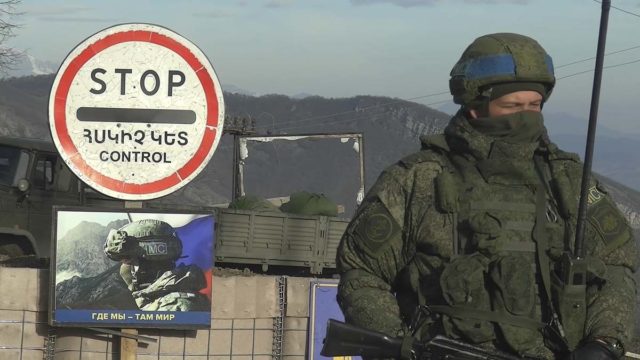
Russian ‘Peacekeeping’ in Karabakh: Old Model, New Features, Mission Creep (Part Three)
Publication: Eurasia Daily Monitor Volume: 18 Issue: 14
By:

*To read Part One, please click here.
*To read Part Two, please click here.
The Armenian-Azerbaijani conflict over Karabakh was the only Soviet-legacy conflict that did not feature Russian “peacekeeping” troops during the 26-year period between the first armistice, in 1994, and the latest armistice, of November 10, 2020. The interposition of Russian troops would only have ensured perpetual stalemate and Russian manipulation of the unresolved conflict. It would have precluded Azerbaijan from regaining its Armenian-occupied territories under international law. At the same time, even Russia-friendly leaders in Yerevan realized that Russian military protection of Armenian territorial gains would have hastened the loss of Armenia’s own independence vis-à-vis Russia. Thus, both Azerbaijan and Armenia tenaciously resisted the notion of Russian “peacekeeping” through the years. Ultimately, Armenia’s bilateral alliance with Russia did somewhat undermine Armenia’s independence by 2013; but even at that stage, Yerevan did not take the further step of inviting Russian “peacekeeping” troops.
The Organization for Security and Cooperation in Europe’s (OSCE) Minsk Group, mediating this conflict from 1992 onward, had envisaged a peacekeeping operation with multinational composition, under a legitimate international organization’s mandate. The Minsk Group’s co-chairing countries—Russia, the United States and France—agreed among themselves as well as with Armenia and Azerbaijan, from 1994 onward, that any peacekeeping contingent would not include troops from the co-chairing countries, nor from regional countries (“no co-chairs, no neighbors”). That formula was mainly designed to exclude Russian, US and Turkish troops from any peacekeeping operation. The Minsk Group co-chairs’ conflict-settlement proposals to Baku and Yerevan always included the deployment of multinational peacekeeping troops as part of the package (see EDM, November 25, December 1, 3, 7, 2020).
The most recent package proposal of that nature was submitted by the Minsk Group’s co-chairs to Yerevan and Baku in June 2019, according to the Kremlin’s retrospective account (Rossiiskaya Gazeta, January 20, 2021). By 2019, however, the Armenian government of Prime Minister Nikol Pashinian had blocked the political negotiations, thus rendering any discussion about multinational peacekeeping moot. By mid-October 2020, facing disaster in the 44-day war, Pashinian turned receptive to Russian President Vladimir Putin’s proposal for a Russian unilateral “peacekeeping” operation. Azerbaijan’s President Ilham Aliyev played a winning hand, negotiating the armistice terms with Putin after Baku had achieved most of its territorial objectives in Karabakh (see EDM, November 12, 13, 25, 2020).
Russia’s unilateral operation circumvents and deceives the Minsk Group’s co-chairing countries and the OSCE writ large. It also contravenes the basic United Nations–approved norms and standards for peacekeeping operations, as followed by legitimate missions worldwide, except by Russia in its claimed domain (see Part One in EDM, January 21, 2021). Nevertheless, both of these institutions have—each for its own reasons—met this affront with silence.
The Minsk Group’s mandate from the OSCE had included the task of considering a multinational OSCE peacekeeping force in the Karabakh conflict theater. For this purpose, the OSCE had, as early as 1994, formed a “High-Level Planning Group” (HLPG) comprised of a small number of seconded military officers “to make recommendations to the Chairman-in-Office regarding a possible OSCE multinational peacekeeping force.” However, its mandate turned out to be insufficient for that purpose. And even an OSCE multinational civilian observation mission would have required (among other things) unanimous consensus—a euphemism for Russian approval. Twenty-six years later, the HLPG was still in existence, this time chaired by an Albanian officer appointed by the OSCE’s 2020 Albanian chairmanship (Shrmonitor.org, October 28, 2020; Osce.org, January 14, 2020).
The OSCE never undertook a peacekeeping operation due to lack of capacity, expertise and resources, as well as Russia’s internal veto. This latter factor makes it unlikely that the Minsk Group could have initiated a credible peacekeeping operation in Karabakh. The Kremlin would, at the very least, have used its veto power to stonewall the negotiations over the operation’s mandate, composition, and financing; and it would, at best, have allowed an ineffective operation. Institutional embarrassment is the likely reason behind the silence of the OSCE’s 2021 Swedish chairmanship and the Minsk Group’s US and French co-chairs in the face of Russia’s deception.
While the OSCE is accustomed to, and embarrassed by, Russia thwarting, harassing or manipulating this organization’s field missions, the attitude seems to be different at the UN headquarters. The UN Secretary General’s Office, responsible for handling peacekeeping (peace support) operations, is indirectly legitimizing Russia’s Karabakh operation, notwithstanding its incompatibility with the UN’s own norms and standards (see above). Russia’s Foreign Minister Sergei Lavrov had ambitiously sought a direct endorsement: he wanted “the UN Security Council to welcome the armistice agreement” with the peacekeeping clauses as its centerpiece (TASS—Mezhdunarodnaya Panorama, November 12, 2020). The UNSC had, in 2015, unanimously adopted a resolution supporting the Minsk Two “agreement” against Ukraine—a document that Moscow routinely invokes to this day.
In the Karabakh case, UN endorsement has been limited to expressions of “relief,” “welcome” and “gratitude” from Secretary General António Guterres, via his spokesperson as well as directly, to Lavrov over Russia’s deployment of “peacekeepers.” The UN Secretary General’s Office proposes to work with Russia and its “peacekeeping” troops in the field for humanitarian tasks (TASS—Mezhdunarodnaya Panorama, November 10, 13, 23, December 3, 4, 10, 2020). Such cooperation would add an unwarranted semblance of legitimacy to yet another Russian sphere-of-influence rebuilding effort.



